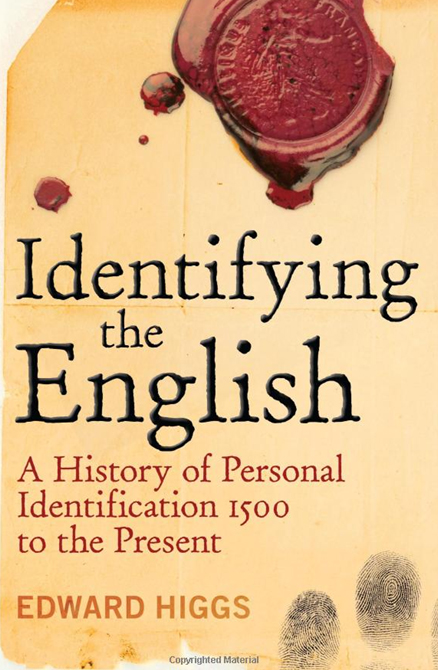Identifying the English
Review

Identifying the English: A History of Personal Identification, 1500 to the Present by Edward Higgs (Continuum), 2011 286pp., £25 hard, ISBN 978-1-4411-8203-6
Who we are is increasingly seen as an important issue in British politics and is an integral part of the increasingly pervasive and intrusive ‘information and security state'. We are continually asked for identification to prove who were are and the theft of personal identities have become more common as ours means of identification has multiplied: certificates at birth, passports to leave and enter countries, driving licenses, credit and supermarket loyalty cards. Identifying the English looks not only at how criminals have been identified such as branding, fingerprinting, DNA but also at the identification of the individual with seals and signatures, of the citizen by means of passports and ID cards, and of the corpse. This obsession with personal identity was long assumed to be a consequence of the Industrial Revolution and took shape during the Victorian era and reflects the increasing mobility and anonymity of society. Beginning his history in the medieval period, Edward Higgs suggests that identification was a pressing issue before the Industrial Revolution calling into question the notion of early-modern England as a face-to-face society. He concluded that the increasing emphasis on personal identity was a consequence of the changing nature of the State and commerce and their relationship with citizens and customers since 1900. The state is no longer minimalist or ‘watchman' in form or even simply supervisory and regulatory but can and does intrude into people's lives across a whole range of individual activities that were previously regarded as private. This has been aided by the development in technology so that our names appear in the plethora of databases outside our control available to government and private organisations. The Victorian notion that ‘Knowledge is Power' has taken on an increasingly problematic nature since it is obvious that individuals no longer have absolute control over their identity. Who we are is increasingly defined for us by organisations with little democratic accountability.
To illustrate the problem of personal identity and the spurious use to which it was put across time, Edward Higgs examines the cases of Perkin Warbeck the impostor who claimed Henry VII's throne, the Tichborne Claimant and John Stonehouse who faked his own death to start a new life in the 1970s. This is followed by three chapters on early-modern England that concern identifying the great and the good, the ‘poor' citizen and the deviant. The remainder of the book considers the ways in which people were identified from the Industrial Revolution to the present-day. Higgs argues that there was a shift from a ‘Dossier Society' towards the ‘Digital Person' in a Digital Database State. This is a bold and original approach that provides a valuable analysis of the nature of self and the ways in which that is under threat and has been under threat as a result of creeping state development.

